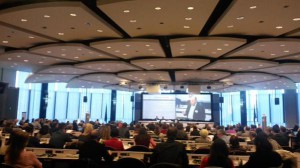I had the pleasure of being a panellist for the Association of Internet Researchers (AoIR) plenary session yesterday, along with Helen Kennedy and Seeta Peña Gangadharan. I thought I’d share the text of my short presentation here.
In my time I want to focus on one part of the session descriptor, namely ‘how can we live well with data, rather than just survive.’ This is an issue that I’ve been giving some thought to and discuss at length in a recent book, Slow Computing: Why We Need Balanced Digital Lives, written with Alistair Fraser (available for the duration of the conference for £7 using the code SC20 at BUP website). Rather than simply critique how digital society is unfolding, we wanted to set out practical and political interventions which can be performed individually or collectively that push back against the negative aspects of living digital lives; that allow people to claim and assert some level of control and advocate for a different kind of digital world. In short, how can people live a ‘digital good life’, or as we put it in the book, ‘experience the joy and benefits of computing, but in a way that asserts individual and collective autonomy?’
In the book, we focus our attention on how our everyday lives have been transformed by digital technologies in two key respects.
The first is with respect to time and how networked devices have ushered in an era of network or instantaneous time, where people are always and everywhere available, encounters are organized on-the-fly, tasks become interleaved and multiply, there is working-time drift, and individuals can feel they are tied to a digital leash that leaves them harried and anxious. Technologies are altering the pace, tempo and temporal organization of digital life in ways that are not always to our benefit or well-being.
Our second concern is with respect to data and how increased datafication and dataveillance is enabling companies and states to profile, socially sort, target, nudge and manage us. How excessive data extraction is fuelling the growth of data capitalism and reshaping governance, governmentality and citizenship in ways that erode civil liberties. It is these issues, and living well with data, that I concentrate on here.
There is no doubt that the era of ubiquitous computing and big data has resulted in excessive data extraction. Many digital technologies and services practise ‘over-privileging’; that is, seeking permission to access more data and device functions than they need for their operation alone. This has eroded privacy, created new predictive privacy harms, expanded data markets and the ways in which companies can accumulation profit by leveraging value from personal data, and underpins new forms of technocratic, algorithmic, predictive and anticipatory governance. There is significant data power – expressed through data capitalism and the state’s use of data – that reproduce structural inequalities unevenly across people (related to class, gender, race, ethnicity, disability, etc.) and places (well-off and poorer neighbourhoods, regions, global north/south).
The question is what to do about this? Our answer is what we term ‘slow computing’, a term that draws on notions at the heart of the slow living movement – well-being, enjoyment, patience, quality, sovereignty, authenticity, responsibility, and sustainability. Slowness is about enacting a different kind of society, in our case both in relation to time and data. It is about using devices and apps without feeling harassed, stressed, coerced, or exploited; and it is about challenging and transforming iniquitous and exploitative structural relations.
Conceptually, our argument is underpinned by the concepts of an ethics of digital care, data justice, and time and data sovereignty. Rooted in the ideas and ideals of feminism, an ethics of digital care promotes moral action at the individual and collective level to ensure personal wellbeing and aid for others. It recognizes that we are bound within webs of responsibility, obligations and duties and advocates acting reciprocally and non-reciprocally to tackle data injustices. Data justice draws much of its moral argument from the ideas of social justice, seeks fair treatment of people through data-driven processes, and challenges data power in various ways, including data activism. Data sovereignty, rooted in the work of indigenous scholars, is the idea that we should retain some degree of authority, power and control over the data that relates to us, that we should also have a say in the mechanisms by which those data are extracted, and that other entities, such as companies and states, should recognize that sovereignty as legitimate.
Using these ideas we set out individual and collective tactics – both practical and political – for asserting data sovereignty and expressing an ethics of digital care. At an individual level, this includes various means to curate digital lives, use open source alternatives, step away from technologies, and obfuscate. At a collective level, it includes political campaigning and lobbying, placing pressure on companies, creating data commons, undertaking counter-data actions, producing open source, privacy enhancement tech and civic tech.
At the same time, we recognize that different groups of people have varying opportunities to practice slow computing; to live well with data. The ability to exert data sovereignty varies by class, gender, race, ethnicity, etc. Poorer and more marginalized populations are more often the focus of data power and are least able to resist and pushback. This is why a collective ethics of digital care is vital; to seek data justice for all.
Of course, we’re not the only folks thinking about this, with much of the work concerning data ethics, data justice and data activism seeking to envisage a different kind of digital society and push back against the worst excesses of dataveillance and data capitalism. However, there is much more theoretic, empirical, advocacy and activist work needed within and beyond the academy if we are to live well with data


